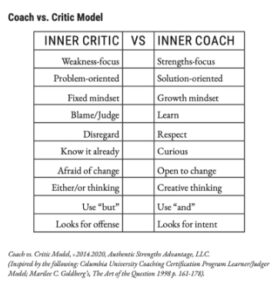
Fatima Doman
Author, Speaker, Positive Psychology Coach, and CEO at AuthenticStrengths.com
Silence the Inner Critic, Discover the Inner Coach
Positive Psychology To Bring Out Your Best
Consider a high-performing musician who in her quest for perfectionism is painfully self-critical each time she makes a mistake. Is that internal, criticizing voice the key to her success? What if there was a better, more sustainable way to bring out the same, or an even higher level, of excellence? What if the key to unleashing greatness is to silence the inner critic and to discover the inner coach?

Recognizing Effects of Self-Talk
Let’s do an exercise that shows how self-talk affects us. Pay attention to how your body feels as you read the following two lists of words, rather than just passively reading them. This enables you to observe what your body is trying to tell you.
The list on the left characterizes the inner critic and the one on the right characterizes the inner coach. Positive psychology and the world’s wisdom literature point to the body’s innate knowing if we would only stop long enough to listen. Also, observe the thoughts that pop into your head as you read each list of words, and pay attention to the emotions you experience.
Now, take a few deep, cleansing breaths as you slowly read the inner critic list first, followed by the inner coach list below:


Amplify the Inner Coach
The columns represent the self-talk we are tuning in to at any given time. I call this a “mindset check” because it helps you recognize which voice you are focusing on currently — the inner critic or the inner coach.
This mindset check is a powerful part of becoming a coach to yourself and sharing what you learn with others. The goal is to turn down the volume on the debilitating voice of the inner critic and to develop the habit of listening more consistently to the constructive, positive, resilient, growth-inducing messages that come from your inner coach.[i] Even when you’ve made a mistake, you can better motivate positive change with constructive self-talk, spoken as an inner coach rather than as an inner critic.
Learning to tune in to the language of your heart, which is the source of your inner coach, reconnects you with your highest and best self. As you develop the skill of listening to your inner coach, you may discover a sincere desire to make constructive changes. This is a life-altering shift for many people as they break free of the despair and discouragement that has paralyzed them in the past.
I invite you to make beautiful music in your own life as you discover your inner coach and turn up the volume on its empowering self-talk. Leveraging your character strengths can help you do this. Celebrate the victory of not putting yourself down, and encourage yourself with your strengths instead. That is a big win!

Positivity Journal
- Did you notice any changes in how your body felt or your thoughts and emotions while reading each list?
- Which list had a more positive impact on you? Why?
- Are you leaning more toward a coach or a critic mindset?
- What positive changes will you make to turn down the volume on your inner critic and amplify the volume on your inner coach?

Author, speaker, coach, and CEO of Authentic Strengths Advantage Fatima Doman has motivated audiences across six continents to leverage their authentic strengths for transformation. An influential voice in wellbeing, resilience, engagement, and leadership, she is passionate about empowering people for sustainable high performance at work and in life.
For decades, Fatima has worked successfully with Fortune 100 and Fortune 500 clients representing a variety of industries and with educators around the globe. Her books, “Authentic Strengths,” “Authentic Resilience”, and “True You,” have been featured by ThriveGlobal.com, the Huffington Post, and Psychology Today and on TV, radio, and e-learning platforms, and her workshops have been licensed throughout the world. Learn more at AuthenticStrengths.com.
i Mayo Clinic Staff. “Positive Thinking: Stop Negative Self-Talk to Reduce Stress” Mayo Clinic. Accessed March 25, 2020. https://www.mayoclinic.org/healthy-lifestyle/stress-management/ in-depth/positive-thinking/art-20043950.
